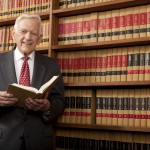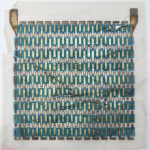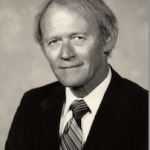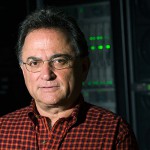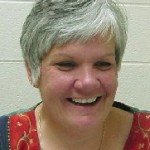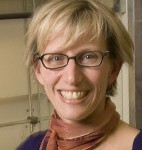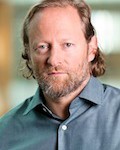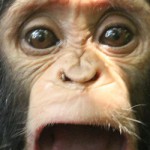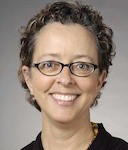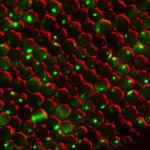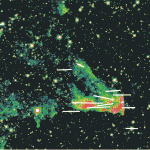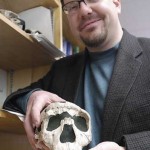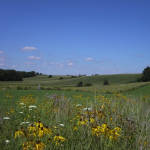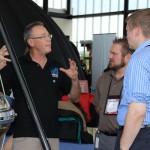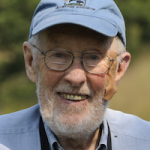Tag Research
WARF’s Bremer remembered as technology transfer legend
Sustained by a passion to improve people's lives, Howard Bremer's enduring commitment to innovation fueled his work and his life. Bremer, 90, a WWII U.S. Navy veteran and patent attorney with degrees in law and chemical engineering from the University of Wisconsin–Madison passed away Friday, ending a remarkable career at the Wisconsin Alumni Research Foundation that spanned 53 years. Read More
The chemistry of color: Energy researcher develops dye-based solar cells
University of Wisconsin–Madison researchers working at the intersection of basic and applied science focus on key factors like cost, environmental impacts ... and sometimes, color. Read More
UW’s bug-eating advocate had global impact
When Gene DeFoliart had his brainstorm in 1974, not even he thought his brainchild would be an easy sell. As a professor at the University of Wisconsin–Madison, DeFoliart was focusing on how insects spread viral disease. Now he was captivated by an opposite proposition: using insects to foster human health — using them, to be specific, as food. Read More
Miron Livny: Collaborative spirit supports Nobel Prize-winning science
In 1964, François Englert and Peter Higgs theorized the existence of a subatomic particle that gives all other particles mass. Nearly 50 years later in 2012, a global team of researchers found evidence that supports the existence of the Higgs boson particle at the Large Hadron Collider (LHC) in Geneva, Switzerland. Read More
Physics Nobel awarded for Higgs particle; UW played key role in research
UW–Madison teams led by physicists Sau Lan Wu and Wesley Smith have played crucial roles in the development and operation of the two main experiments at the Large Hadron Collider (LHC) that discovered the Higgs boson in July 2012. Read More
UW-Madison team probes home health environments with virtual reality
In health care environments, nurses and doctors can closely monitor patients' medical regimen and schedules. But when a patient leaves the clinic or hospital to go home, the responsibility for care transitions to families and patients. The result: Regimens might not be adhered to as closely. Read More
UW-Madison launches national Agricultural Innovation Prize
As the world's population continues to increase, so does the need for sustainable and secure food systems. A new student contest run by the University of Wisconsin–Madison advances the idea that long-term solutions in agriculture cannot draw on innovations from only one discipline. Read More
UW scientist sniffs out possible new tick species
In June 2012, Tony Goldberg returned from one of his frequent trips to Kibale National Park, an almost 500-square-mile forest in western Uganda where he studies how infectious diseases spread and evolve in the wild. But he didn’t return alone. Read More
UW–Madison researchers put NIH grant review process under microscope
The National Institutes of Health’s system for selecting research projects may be considered the gold standard for equitably awarding funding, but that hasn’t kept the agency from dispatching three University of Wisconsin–Madison professors to probe the system for bias. Read More
Zinc discovery may shed light on Parkinson’s, Alzheimer’s
Scientists at the University of Wisconsin–Madison have made a discovery that, if replicated in humans, suggests a shortage of zinc may contribute to diseases like Alzheimer's and Parkinson's, which have been linked to defective proteins clumping together in the brain. Read More
Exhibiting signs of life
What if you could travel back in time 3 billion years, and take a breath? What would earth’s air smell like? Deeply stinky, according to Brooke Norsted, an outreach specialist for the University of Wisconsin–Madison Geology Museum. Read More
Mouse studies reveal promising vitamin D-based treatment for MS
A diagnosis of multiple sclerosis (MS) is a hard lot. Patients typically get the diagnosis around age 30 after experiencing a series of neurological problems such as blurry vision, wobbly gait or a numb foot. From there, this neurodegenerative disease follows an unforgiving course. Read More
Students game the system, train computer to play Angry Birds
Angry Birds sounds simple: Just slingshot a digital bird at a pile of evil pigs. You could teach a child to play. But could you teach a computer? Read More
Observations reveal critical interplay of interstellar dust, hydrogen
For astrophysicists, the interplay of hydrogen - the most common molecule in the universe - and the vast clouds of dust that fill the voids of interstellar space has been an intractable puzzle of stellar evolution. Read More
John Hawks explores how celiac disease evolved
Celiac disease is an evolutionary paradox, says University of Wisconsin–Madison anthropologist John Hawks. Read More
A shot of anxiety and the world stinks
Researchers using powerful new brain imaging technologies are revealing how anxiety or stress can rewire the brain, linking centers of emotion and olfactory processing, to make typically benign smells malodorous. Read More
Marginal land in demand: researchers explore farmer willingness to grow energy crops
In their quest to make cellulosic biofuel a viable energy option, many researchers are looking to marginal lands - those unsuitable for growing food - as potential real estate for bioenergy crops. However, few people have asked: how do farmers feel about using their marginal lands for fuel production? Read More
Decades on, bacterium’s discovery feted as paragon of basic science
Over time, the esoteric and sometimes downright strange quests of science have proven easy targets for politicians and others looking for perceived examples of waste in government - and a cheap headline. Read More

